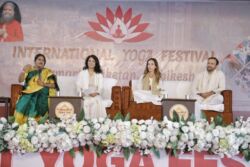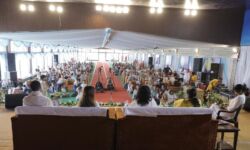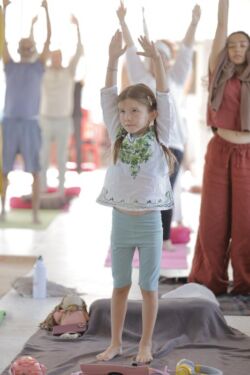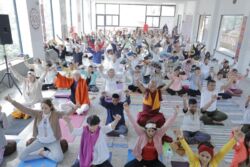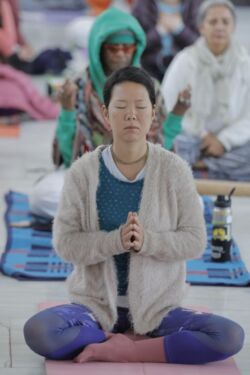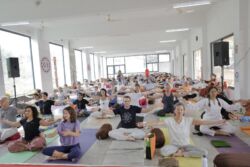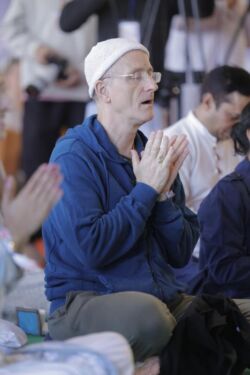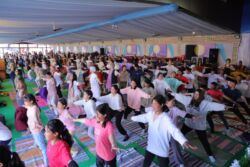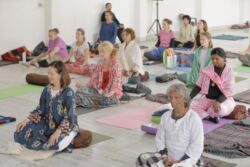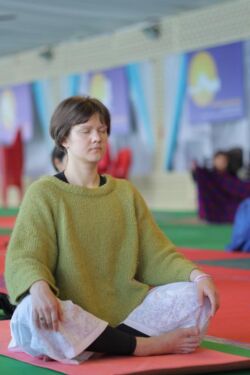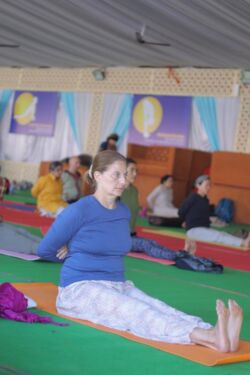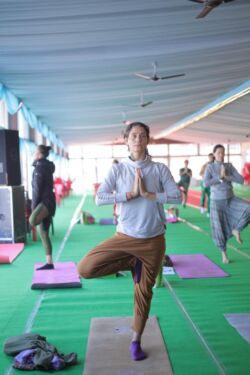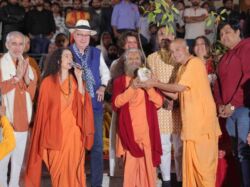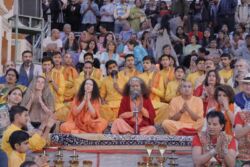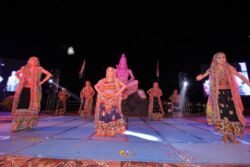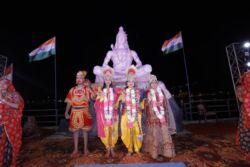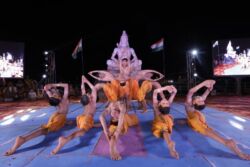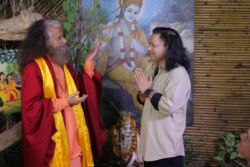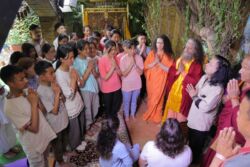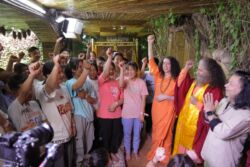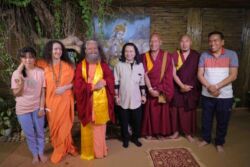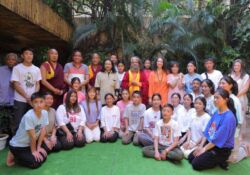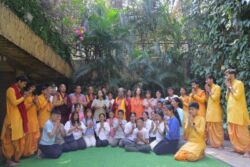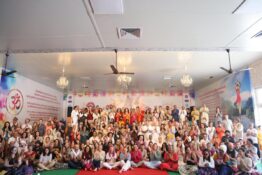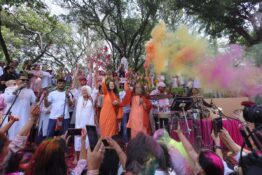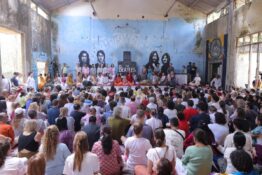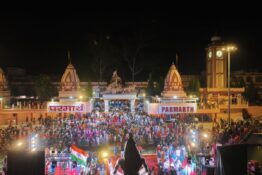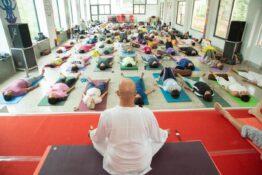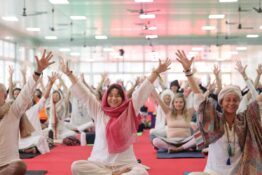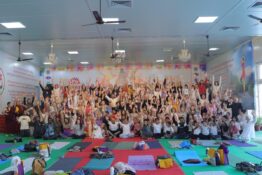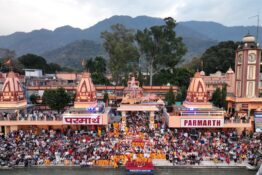World Renowned Ayurvedic and Spiritual Experts Including Vaidya Dr. Padma Nayani Raju, Dr. Smita Pankaj Naram, María Alejandra Avcharian and Anand Mehotra Of er Insights into the Power of Ayurveda to Heal at Day 4 of the International Yoga Festival at Parmarth Niketan
Among the highlights of Day 4 of the International Yoga Festival was an enlightening Wisdom Talk on the Power of Ayurveda to Heal, lead by world leaders in the field, including Vaidya Dr.
Padma Nayani Raju, Dr. Smita Pankaj Naram, María Alejandra Avcharian and Anand Mehotra. The day finished with a special Yoga demonstration and performances by Parmarth Gurukul Rishikumars as well as school children from Divine Shakti Foundation’s schools
IYF is organised by Parmarth Niketan, Rishikesh with the support of Incredible India, Ministry of Tourism, in association with Ministry of Culture and Ministry of AYUSH, Government of India and was officially inaugurated by the Hon’ble Governor of Uttarakhand Lt Gen (Retd) and will have the visit of other Hon’ble Ministers, Diplomats and Dignitaries throughout the week (please see more below).
RISHIKESH: Embarking on a transformative journey, Day 4 of the International Yoga Festival unfolded its petals to reveal the profound “Power of Ayurveda to Heal” in an enlightening
Wisdom Talk, featuring luminaries such as Vaidya Dr. Padma Nayani Raju, who has been trained in Ayurveda since childhood and holds a BAMS in Ayurveda from Rajiv Gandhi University of
Health Sciences, Karnatika; Dr. Smita Pankaj Naram, the Co-Founder of Ayushakti, one of the leading and most trusted ayurvedic health centres around the world; María Alejandra Avcharian,
who studied in Uruguay, trained in India at PDI Prakash Institute and PVA ayurvedic Hospital in Kerala, and did several postgraduate courses both in India and Argentina; and Anand Mehotra, of Rishikesh, who along with founding Sattva Yoga, established the Sattva Yoga Academy. The wisdom talk was moderated by Paula Tapia, an international Yoga, mindfulness and wellness
expert specializing in integrative health, self-care education and healthy lifestyle science.
Dr. Smita Ji shared “core principles that help people gain health and prevent illness and how, using your own kitchen, you can heal yourself.”
“First, you must balance yourself,” Dr. Smita Ji said. “Second, remember this: Listen to your body. For example, when there is fever, the body says, ‘I have toxins, rest.’ The infections cannot
be controlled by the immune system so fast and rest. Third, protect your digestion. Fourth, stop wheat, milk, dairy, meat and deep-fried food. All of these will kill your metabolism. If you take
one of these once, balance your system instantly with mung bean and vegetable soup. Don’t you clean your house daily? Keep your system clean and strong. Fifth, build your health on a daily
basis by taking in the right nourishment. And finally, the key to vibrant health is to detox to renew. You build up your health and you renew on a daily basis.”
Dr. Smita Ji shared a smoothie recipe for all doshas: 10 almonds, 4 walnuts, 2-3 dates (if not diabetic), apple, beetroot, carrot, cardamom, fennel, and avocado and flaxseed, which she said to
crush together and drink on daily basis. She added that someone doing daily yoga asana should add vegan protein, but make sure there are no chemicals in it at all. With this smoothie daily, she
said “You will have so much energy and your tissues will keep nourished and see anti-aging benefits.”
“Ayurveda itself is a spirit-based medicine; a conscious based medicine,” Anand Ji said. “Most medical systems look at the body as a machine. Ayurveda instead looks at the body not as a
machine but as a spiritual body. The foundation of Ayurveda is spirituality, not a reductionist view that the body is just matter. We can’t be healthy without having a deep spiritual foundation.
The fundamental truth underlying the vedas is to know thyself. We must ask, ‘Is the I afraid of disease?’ Patanjali speaks of how fear of death exists in even the wisest. Is our approach to
health rooted in fear and anxiety?”
“If you have a weak pranic system, you can be taking the top supplements, and it won’t work because you don’t have any bioavailability,” Anand Ji continued. “If you have strong prana, a
natural aliveness, your ability to transmute will be stronger. So our spiritual texts are asking to go to that deep level. That’s what Shiva teaches us, the ability to transmute any matter that goes
within us. When you start to engage with that field of life, all of your life becomes medicine. That is one of the biggest invitations of India – to understand who you are and then build your
life from there.”
“Ayurveda is 10,000 year old classic knowledge system which our acharyas have given us,” said Dr. Padma Ji. “We believe Ayurveda has came from Brahma, the creator. He had it in his mind
that Ayurveda is very much essential for mankind now. Ayurveda teaches prevention. How to prevent diseases. If you prevent, you don’t need to think about the disease. No other medical
system tells you about prevention. When the creator created mankind, he also created a science for how to treat our human bodies, spirits, and mind.”
“When we understand our nature we can transform ourselves,” said María Alejandra Avcharian. “When our body hurts or our mind is disconnected, we can’t be concentrated in our spiritual path. We must align our body and our mind. That is the main law that Ayurveda encourages. We can do small changes using practices from Ayurveda to be connected and rooted in our life. To put it simply, what Ayurveda teaches us is about our composition. Which element is in our body in our mind. When we understand which element is out of balance, we can make little adjustments to be at peace in our body.”
DAY 4 SCHEDULE Highlights:
At the break of the Dawn, the participants geared up for the Day 4 of the International Yoga Festival with a packed schedule of Meditation, yoga and divine music.
The morning classes included the Open the Gates to the Ecstatic Heart, with Rishikesh born and raised Master Yogi Ananda Mehrotra. Mehrotra was mentored by his Guru from childhood
leading him to deeper states of self-realization. As a young man, he traveled extensively throughout India studying the teachings from the Vedic and Tantric traditions. He developed
Sattva Yoga as a method through which people of all backgrounds, cultures and experiences can discover and embrace their own true nature, which he shared in the sacred Saraswati Garden at
Parmarth Niketan as the sun rose. Internationally Recognized Yoga Teacher Kia Miller, of the United States, led students through a Kundalini class themed Law of Attraction, as Ma Ganga
lapped against the banks of the Yoga Ghat. Gurmukh Kaur Khalsa, the disciple of Yogi Bhajan who founded Yogi Bhajan’s first yoga center in the United States, also led a Kundalini class later
in the morning that taught students how to open their hearts to the light that exists within all souls.
After a light, satvik and a nutritious brunch, the second series of sessions included a special Lila Shakti Dance Asanda class led by Erica Kaufman, the founder of Lila Yoga and the owner of
Lila Yoga Studios in PA, USA. Influenced by JidduKrishnamurti’s philosophy and Krishnamacharya’s teachings, she offered a traditional Hatha Yoga practice, with Raja (philosophical), and Bhakti (devotional) Yoga integrated together. Proving yoga truly is for all, Dr. Eden Goldman, Director of the Yoga and Healing Sciences Program at Loyola Marymount University in Los Angeles, CA, taught Yoga for Athletes while Mansi Gulati, International Yoga exponent, who has worked and actively campaigned for the novel concept of ‘Face Yoga’, led a class on Face Yoga for Wrinkles.
After lunch, the wonderful Nrityavali dance company taught international guests a lively workshop on the traditional folk dance styles of Gujarat and Rajasthan. Nrityavali is derived out
of the Indian words “Nritya” and “Avali”. Nritya means Dance, and Avali means a Series, a Legend. Together making the meaning of a Series and a Legend of Dance out of Nrityavali.
Founded by India’s Ace Performing Artists, Mr. Bharat Bariya and Mr. Akshay Patel, Nrityavali, is an emotive creation of an Independent Dance Company.
Meanwhile, for the more meditative participants, Sadhvi Abha Saraswati led students in a deeply rejuvenating Yog Nidra. Saraswati, an avid yoga practitioner since the age of twenty-five, cured
herself of a terminal kidney ailment called nephritis through yoga. And Joseph Schmidlin (D.O.mtp, LMT), a classical osteopath physician, and sound practitioner with over 25 years of teaching and practice in the field of energy medicine, including Traditional Chinese medicine and Ayurveda, led students on a Sacred Sound Bath Journey. Schmidlin utilized sonic vibrational medicine and Nada yoga to make it seem like time itself slipped away. Krishnaprya, a musician and the organizer of this year’s Sacred Sound Stage, shares a bit more on the flow of the musical performances throughout the day. “This year at the Sacred Sound Stage, we’re thrilled to feature a gifted lineup of kirtan, mantra, and sound artists all offering their unique gifts and teachings. Each day will begin with a Sunrise Chanting, followed by a full schedule of enriching kirtan sessions, and a varying array of mantra, movement, sound, and voice workshops. We’ll round out each day with our popular and much in demand restorative Sound Baths, crafted to rejuvenate and heal.”
After a short tea and Snacks break the participants headed to the attend the sacred Ganga Aarti and the divine golder hour that gives no hangover the next day in the beautiful presence of Pujya
Swami Chidanand Saraswati, President of Parmarth Niketan, the Pujya Sadhvi Bhagawati, Director of International Yoga Festival.
Day 4 of the International Yoga Festival closed with a special Ganga Aarti dedicated to karma yoga, sacred service, followed by a remarkable, boisterous, and colorful cultural dance performance that showcased diverse regional dances of India, performed by Parmarth Niketan Gurukul Rishikumars and girls from the schools supported by the Divine Shakti Foundation.
Pujya Sadhviji Bhagawati Saraswati Ji said, “Rishikesh is the land of yoga, and in our festival we have so many lineages of yoga. This evening I’d like to talk about an aspect of yoga that isn’t
talked about so much in most festivals, but as Bhagwan Krishna talks about in the Gita, is one of the most powerful ways to attain union, oneness, realization, moksa, enlightenment, and that is
karma yoga. The word karma means action. Yoga is that reunion, coming back together with the divine. So karma yoga is predicated upon an awareness of union. It’s not just serving food in a
soup kitchen, it’s every minute, every moment, how we live our lives.
She continued, “Pujya Swamiji’s teaching is ‘don’t just do yoga, be yoga.’ It means every action we are acting from a remembrance of union. When my stomach is hungry, I feed it. We take care
of that self. Real karma yoga is action in which I am aware every single empty tummy on this planet is mine. That every single aching being on this planet is me. That there is no separation,
we are one. And therefore, we serve.”
QUOTES FROM PRESENTERS & PARTICIPANTS:
Ira Trivedi, best-selling author, yoga expert, and founder of Namami Yoga said, “It’s great to be back. IYF gets better every year. It’s special to be able to reconnect and meet new people. The
teaching for our moment is the health and wellness of a physical practice of yoga is deeply transformative. This is the message I hope women, especially the women of India, hear.”
Internationally acclaimed yoga teacher Seane Corn, from the United States, who has been presenting at IYF for many years shared, “One of the things I love about coming to IFY is the
sense of community. In this time of division and conflict we can’t forget to share the value of yoga to transcend the sense of independence and separation that exist. It’s remarkable how many
different cultures and yogic lineages come together here. I recommend students get out of their comfort zones and learn from teachers they haven’t experienced before. You never know what
teacher or what teaching will give you the medicine you need to transcend what holds you back. This is the transformation most needed for the planet and it might just change your whole life.”
Rohan Maclaren, from Australia, is volunteering for his third IYF this year, and had this to share: “I’m volunteering as a sevak because when I came to an ashram in India, and immersed
myself in this priceless yogic tradition, I truly began to welcome the divine into my life. It is my sincere hope that everyone who comes to the Festival receives this touch that is available here
and leaves uplifted and transformed.”
“Coming to IYF is a really personally empowering experience, one which is connecting me to others where I see more and more myself in others,” said participant Lico Ruiz-Eichelmann
from Mexico.

